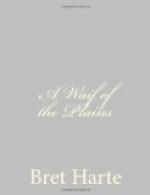Suddenly he heard a distant angry shout. To his first hurried glance the plain had seemed empty, but, looking up, he saw two horsemen rapidly advancing with a led horse behind them—his own. With the blessed sense of relief that overtook him now came the fevered desire for sympathy and to tell them all. But as they came nearer he saw that they were Gildersleeve, the scout, and Henry Benham, and that, far from sharing any delight in his deliverance, their faces only exhibited irascible impatience. Overcome by this new defeat, the boy stopped, again dumb and dogged.
“Now, then, blank it all, will you get up and come along, or do you reckon to keep the train waiting another hour over your blanked foolishness?” said Gildersleeve savagely.
The boy hesitated, and then mounted mechanically, without a word.
“’Twould have served ’em right to have gone and left ’em,” muttered Benham vindictively.
For one wild instant Clarence thought of throwing himself from his horse and bidding them go on and leave him. But before he could put his thought into action the two men were galloping forward, with his horse led by a lariat fastened to the horn of Gildersleeve’s saddle.
In two hours more they had overtaken the train, already on the march, and were in the midst of the group of outriders. Judge Peyton’s face, albeit a trifle perplexed, turned towards Clarence with a kindly, half-tolerant look of welcome. The boy’s heart instantly melted with forgiveness.
“Well, my boy, let’s hear your story. What happened?”
Clarence cast a hurried glance around, and saw Jim, with face averted, riding gloomily behind. Then nervously and hurriedly he told how he had been thrown into the gully on the back of the wounded buffalo, and the manner of his escape. An audible titter ran through the cavalcade. Mr. Peyton regarded him gravely. “But how did the buffalo get so conveniently into the gully?” he asked.
“Jim Hooker lamed him with a shotgun, and he fell over,” said Clarence timidly.




